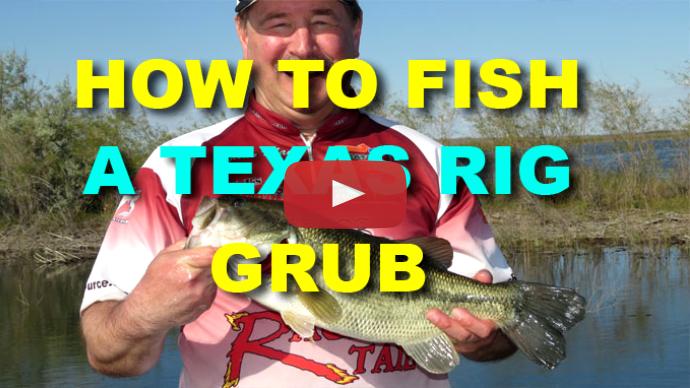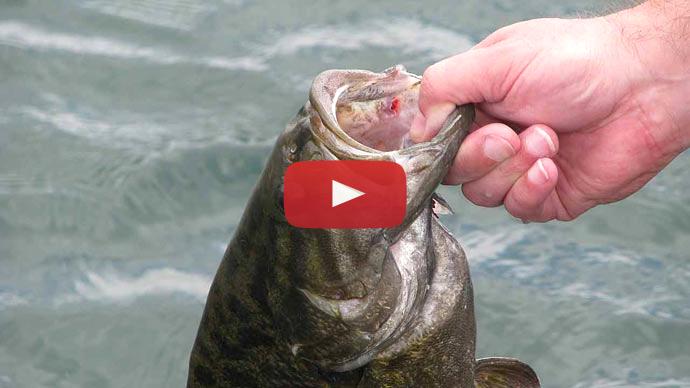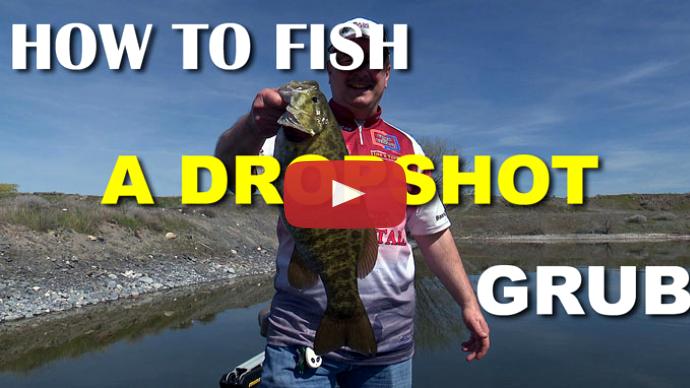There we are! That was easy. Just a little grub on a jig head. Ooh, he wants to play today. This is candy man, they just cannot resist this, cannot resist it. Come on, don't go under the boat. It's light line, you gotta take your time getting them in. Look at this, look at this. Here we go.
Fell victim to a grub here on a jig head. That's were talking about today. Today I'm gonna show you how to rig it, what type of equipment to use. And then I'm gonna take you on the water and show you what techniques you can use for fishing a grub on a jig head.
Hey folks, Glenn May, here with BassResource.com. Today I want to talk to you about fishing grubs. Grubs on a jig head to be specific.
If you're not sure how to rig this, I’ve got a video on how to rig grubs, It's linked underneath this video here, you can take a look at that later, but right now you talk to you about the different equipment and terminal tackle to use and then I'm going to take you out and show you how to fish it.
So first off, what I'm using here is a ball head jig and it's got a wire guard on there. It's a real light wire hook. It's about a 1/0 hook, thin for finessing but the guard on there keeps some of the weeds and gunk off of it and prevents it from getting hung up and stuff.
Tied to it I'm using 6 pound fluorocarbon line. The fluorocarbon gives me gives me that sensitivity I need to feel those light bites plus it's clearer in water and doesn't get to be seen as much. It's a little more invisible, if you will. I fish in real clear water so that's important.
Because we're using real light line we need to match it up with the right rod. So a medium, light action rod. . . that's the kind that you want, because if you have anything heavier than that you risk breaking the line or straightening out that hook during the fight and during the hook set. So medium light action spinning outfit is what we are doing.
Let me tell you little bit about the weight here. This weight is just an eighth ounce weight. That's a great starting point. Good all round size to use. A lot of the bites come on the fall, so you want a nice slow fall. You can go up to a quarter ounce weight if you want. If you're fishing really deep that's not a problem, but I wouldn't really want to go any higher than that. So you don't need a whole bunch of jig heads. Just get yourself an eighth ounce, quarter ounce, maybe a three eighth but no, that's even too much. That's all you need. Simple set up. Now we're ready to go. Now you know the equipment. Now you know the gear. Let's go out fishing.
All right, so what I'm fishing here is kind of a rocky point, some underwater boulders, with no weeds, which is a great place to fish this rig. Even though I have a wire guard here for weeds, I don't have to worry about it because I don't have any weeds.
Really all it takes is a nice light cast you don't want to throw it out really far. Just throw it out, and then let it sink a little bit and then you're going to reel it back. That's the first technique I'm going to show you here.
So you just cast that grub out there. Let it fall. I flip the bail, and then all we are going to do is a steady retrieve. Point the rod tip down towards the water and slowly bring it back. And try to follow the contour of the bottom. So you might want give it a little pause, let it sink a little bit and then reel again. And that's all we are going to do, is follow this point on out and see if there are any fish hanging out on the bottom.
Now the bite sometimes is real subtle, so you have to pay real close attention to feeling that. So I like to put the rod at a little bit of an angle here. It's a little bit easier to detect the bite.
Now to set the hook, because this wire, light wire hook it's exposed and you're only using 6 pound test, you don't have to set the hook really hard. Matter of fact if you really pop it hard, you're just going to break the line or straighten out that hook. So instead just reel a bit harder, just pull back on it and you will set the hook. It doesn't take much effort to get that light wire hook to go past the barb in the fish's mouth and then you have them.
So let me show you one other way I like to fish this. And that is, you throw it out there and let it fall. In this case you are going to let fall way to the bottom, so when you do pay real close attention to that line. If there are any fish that hits it while it’s falling the line will pop, twitch, jump, jerk, do something like that. If that happens you want to set the hook.
Now it's at the bottom, all you're going to do it point the rod tip down towards the water and now lift it up to about the 11 o'clock position and then let it fall. And all I'm doing is I'm letting, I'm following the drop with the rod tip and I'm reeling up the slack as I do it. I'm not moving the bait ahead with the reel, I'm doing that with the rod. So just lift up, slowly, and just let it fall, flutter right back down. A lot of times those bites occur right as the bait is falling.
And that's really all there is to it to fishing grubs, it’s very simple, straightforward. The thing about though, here's a little tip, if you're catching fish on crankbaits, matter of fact this is a really good place to . . . anywhere you throw crank baits, that's where you want to throw this, but if you are catching fish on crankbaits and the bite dies off. Pick up a grub and go back through those areas and you will start catching fish again. So you can cover a lot of water doing it this way, too. Great way to catch a lot of fish.
Now, I'll fish a little bit differently in the summer than I do in say the spring. In the summer I'm fishing a little bit deeper. I'm fishing main lake points, I might fish humps, that sort of thing. Whereas in the spring I will go shallow, I will go back to coves, flats, secondary points, those are the things I will be targeting. Great bait to use during those times of the year especially when the fish are active and feeding on bait fish.
For more tips and tricks like this visit BassResource.com.



